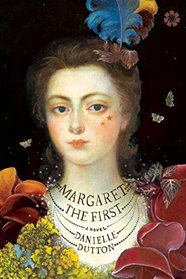Fell in love with Margaret Cavendish. With the novel, not so much ....
An interesting introduction to the life and achievements (and strangeness ...) of Margaret Cavendish, Duchess of Newcastle -- proto-science fiction writer, scientific philosopher and a woman ahead of her time ... ahead of any time, really.
I liked the novel, and found it interesting and well written -- I thought it was especially interesting for capturing the way that Margaret's European exile during Cromwell's Protectorate, as the daughter of a loyal Royalist family, would have shaped her philosophy, her attitude to the scientific discoveries of her era, and her wild imaginings. (Make no mistake, as the novel makes clear, young Margaret Lucas was a strange one before the English Civil War killed or scattered her family, and sent her into exile, first with the Court to Paris, and then with her much-older husband to genteel poverty in Antwerp. But Dutton suggests how the years of exile shaped and focused that strangeness, how the uncertainty of life with the entitled expectations of aristocrats, but no money or influence to back it up, might have shaped her world-view, and her willingness to face ridicule to express her idea.
But for such a BIG character, it feels like such a slight novel: told half as first-person, in Margaret's own voice and, then, abruptly, half as third person (after Charles II's restoration, and the Cavendishes' return to London, and promotion to Dukedom, if not exactly to the influence and affluence they had hoped for), it still can't do much more than "stick to the facts, ma'm." It feels to me as if the author is trying, with some fancy footwork, to exercise some agency on a narrative where the dice have already been thrown, and the outcomes can easily be -- Spoiler Alert! -- discovered, if you trouble to check the Wikipedia page.
Which makes me wonder -- what are novelised versions of real people and real events for ? I've read enough of them that I've felt were unsuccessful, or disappointing, to wonder at what authors think they're going to achieve with a lightly fictionalised account of a life where the narrative can't be changed, only interpreted.
Probably the most successful attempt of the past decades is Hillary Mantel's Wolf Hall trilogy, where Mantel so thoroughly reimagines the perspective (and context) of a heretofore demonized historical figure that she completely reinvents him: the reader grudgingly falls in love with him, becomes a silent accomplice to his crimes, and grieves at his downfall.
So what does Danielle Dutton (NO RELATION, btw!!) accomplish for Margaret Cavendish, with her fictional flourishes? No reinvention, I'm afraid. Perhaps a better understanding of her context (personal and historical).
It made me want to read more about her -- non-fiction, perhaps -- and to read some of her work, unfiltered, So there's a win, for all concerned...
An interesting introduction to the life and achievements (and strangeness ...) of Margaret Cavendish, Duchess of Newcastle -- proto-science fiction writer, scientific philosopher and a woman ahead of her time ... ahead of any time, really.
I liked the novel, and found it interesting and well written -- I thought it was especially interesting for capturing the way that Margaret's European exile during Cromwell's Protectorate, as the daughter of a loyal Royalist family, would have shaped her philosophy, her attitude to the scientific discoveries of her era, and her wild imaginings. (Make no mistake, as the novel makes clear, young Margaret Lucas was a strange one before the English Civil War killed or scattered her family, and sent her into exile, first with the Court to Paris, and then with her much-older husband to genteel poverty in Antwerp. But Dutton suggests how the years of exile shaped and focused that strangeness, how the uncertainty of life with the entitled expectations of aristocrats, but no money or influence to back it up, might have shaped her world-view, and her willingness to face ridicule to express her idea.
But for such a BIG character, it feels like such a slight novel: told half as first-person, in Margaret's own voice and, then, abruptly, half as third person (after Charles II's restoration, and the Cavendishes' return to London, and promotion to Dukedom, if not exactly to the influence and affluence they had hoped for), it still can't do much more than "stick to the facts, ma'm." It feels to me as if the author is trying, with some fancy footwork, to exercise some agency on a narrative where the dice have already been thrown, and the outcomes can easily be -- Spoiler Alert! -- discovered, if you trouble to check the Wikipedia page.
Which makes me wonder -- what are novelised versions of real people and real events for ? I've read enough of them that I've felt were unsuccessful, or disappointing, to wonder at what authors think they're going to achieve with a lightly fictionalised account of a life where the narrative can't be changed, only interpreted.
Probably the most successful attempt of the past decades is Hillary Mantel's Wolf Hall trilogy, where Mantel so thoroughly reimagines the perspective (and context) of a heretofore demonized historical figure that she completely reinvents him: the reader grudgingly falls in love with him, becomes a silent accomplice to his crimes, and grieves at his downfall.
So what does Danielle Dutton (NO RELATION, btw!!) accomplish for Margaret Cavendish, with her fictional flourishes? No reinvention, I'm afraid. Perhaps a better understanding of her context (personal and historical).
It made me want to read more about her -- non-fiction, perhaps -- and to read some of her work, unfiltered, So there's a win, for all concerned...




